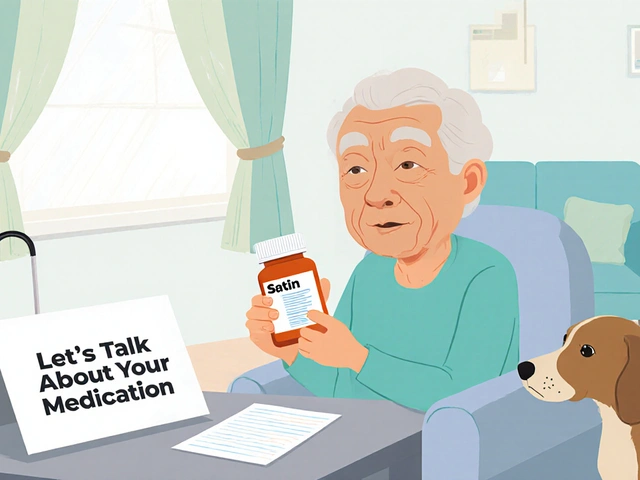
If you're starting on gemfibrozil, you're likely curious about what side effects might crop up. It's a drug that does a good job at managing specific cholesterol levels, but it's a good idea to know what you're getting into. Here, we're covering the basics of what side effects to watch out for and how to handle them like a pro.
The most common side effects can include stomach discomfort, dizziness, or a touch of brain fog. Yeah, these aren't fun, but understanding that they' are usually temporary and manageable can go a long way. Simple things like staying hydrated or mixing up your dietary routine might just do the trick.
Now, not to scare you, but there're more serious side effects to keep an eye on. Sudden muscle pain or unexpected weakness aren't just fatigue setting in; they might need a bit more attention. Got your doctor's number? Keep it handy just in case!
- Understanding Gemfibrozil
- Common Side Effects
- Serious Side Effects: What to Watch For
- Practical Tips for Managing Side Effects
- When to See a Doctor
- Lifestyle Adjustments and Alternatives
Understanding Gemfibrozil
Gemfibrozil is a medication primarily aimed at hitting those tricky cholesterol levels without all the surgical fuss. It's mainly used to tackle high triglyceride levels while giving your good cholesterol—also known as HDL—a nice little boost.
How It Works
So, how does it all go down? Gemfibrozil belongs to a group called fibrates. Think of it as a coach for your liver, nudging it to lower those triglycerides which, by the way, are a type of fat found in your blood. It also perks up the body's natural process of breaking down fats.
Who’s It For?
Doctors usually prescribe gemfibrozil for people with high cholesterol when other lifestyle changes aren’t cutting it. If exercise and eating salad aren't helping, the doc might bring in the big guns with gemfibrozil.
Typical Dosage
The typical game plan is 600 mg taken twice daily, usually about 30 minutes before breakfast and dinner. Timing can be crucial, so try setting those reminders on your phone.
Gemfibrozil has been around for a while, and studies back its effectiveness. Just a quick peek through medical stats shows it dropping triglyceride levels by as much as 50%. Not bad, right?
- Enhances HDL (good cholesterol)
- Reduces LDL (bad cholesterol)
- Taken twice daily for best results
A Quick Look At Side Effects
While it comes with perks, it ain't without quirks. Flushing and gastrointestinal issues are common, so be prepared. And, make sure your healthcare provider's up-to-date on your health history.
Common Side Effects
When taking gemfibrozil, it's crucial to know some of the common side effects. They're generally mild but knowing what to expect can save you a trip to Dr. Google at 3 a.m.
The usual suspects include gastrointestinal issues. We're talking about some stomach aches, possible indigestion, or even diarrhea. Not pleasant, I know. But, it happens because your body's getting used to the medication.
Gastrointestinal Troubles
These can be the number one reason why folks say they have issues with gemfibrozil. Your stomach might start feeling off, especially during the first few weeks.
- Stay hydrated. This one can help keep your stomach soothed.
- Eat smaller, more frequent meals instead of three big ones.
- Avoid spicy or greasy food for a while. Your stomach will appreciate the break.
Dizziness and Tiredness
You might notice that you're not as steady on your feet. Dizziness and a feeling of tiredness can creep in.
If this happens, don't operate heavy machinery or drive until you know how gemfibrozil affects you. It’s better being safe than sorry.
Skin Reactions
Every now and then, users report a rash or mild itchiness. Not a full-blown allergic reaction, but something worth keeping an eye on.
Avoid harsh soaps and try using a gentle moisturizer. It might keep the itchy stuff at bay.
Other Effects
Less commonly, people get temporary hair thinning or a mild headache. Again, these are usually self-limiting and not a cause for big-time worry.
| Side Effect | Frequency |
|---|---|
| Gastrointestinal issues | About 30% of users |
| Dizziness | 15% of users |
| Rash/Itchiness | 5% of users |
Remember, everyone's different, and your body might react uniquely. If you're worried or if things feel off, don't hesitate to talk to your healthcare provider. It's better to chat about it than to sit and wonder.
Serious Side Effects: What to Watch For
While gemfibrozil is generally well-tolerated, a few serious side effects should have you on high alert. Nobody wants to play doctor, but knowing the signs when things aren't quite right can make all the difference.
Muscle Pain and Weakness
One of the potentially serious side effects of gemfibrozil involves muscle pain, tenderness, or weakness. This isn't just your typical “I worked too hard at the gym” soreness. It can signal a condition known as rhabdomyolysis, a rare but serious breakdown of muscle tissue that demands medical attention. Watch out for any unusual discomfort, and don't let it slide.
Liver Troubles
Liver issues can also pop up. If you notice symptoms like yellowing of the skin or eyes (jaundice), dark urine, or persistent fatigue, it's not the time to brush it off. These can be tell-tale signs that your liver's waving a red flag.
Stomach and Digestive Problems
Though less common, some do experience severe stomach pain or vomiting. It might not just be something you ate, and it's wise to get it checked if it persists.
Seeking Medical Help
If any of these serious side effects come knocking, it's crucial to contact a healthcare professional ASAP. It's always better to have a false alarm than to ignore something critical. Keeping a log of symptoms can also be super helpful for your doc.
Remember, your health's not something to gamble with. Being informed can keep you one step ahead with your gemfibrozil treatment, making sure you're getting the benefits without the baggage.

Practical Tips for Managing Side Effects
Alright, let’s dive into some real-world advice on making the journey with gemfibrozil a bit smoother. Facing side effects from this medication doesn’t have to be a solo battle. There are a bunch of ways to manage them without upending your life.
Stomach Woes
First up, let’s talk stomach issues like nausea or upset. These aren't pleasant, but they're manageable. Try taking your gemfibrozil with food. A meal can cushion the blow and help ease digestion. Also, avoid spicy or greasy foods as these can make symptoms worse.
Beat the Dizziness
If you find yourself feeling dizzy, moving slowly when you stand up can help. A sudden change in posture can make things spin more than you'd like. Stay hydrated too. Sometimes, dehydration can sneakily amplify dizziness.
Muscle Pains and Fatigue
Muscle pains can really throw a wrench in your day. Taking regular breaks to stretch, or a slow walk can sometimes fend off stiffness. If the pain persists or worsens, it’s crucial to contact your healthcare provider. Regular exercise, as recommended by your doctor, can help maintain overall well-being.
Dietary Adjustments
Your diet is a big player here. Eating a balanced diet rich in fruits, veggies, and lean proteins supports overall health. Avoid alcohol, as it can interact with gemfibrozil adversely, increasing the risk of side effects.
Regular Check-ins
Let your doctor be your co-pilot. Regular check-ins can ensure side effects are monitored and managed effectively. They might tweak your dosage or suggest alternatives if things aren’t improving.
Importance of Communication
Don’t play tough guy or gal. Talk about what you’re experiencing. Share your struggles with those around you; it can help lighten the load. And remember, your doctor needs to know any side effects you're encountering to provide the best care possible.
When to See a Doctor
While gemfibrozil works well for many, it's vital to know when you need to give your healthcare provider a shout. Some side effects might make you scratch your head, wondering if they're worth a doctor visit. Here's the lowdown on what signs should get you dialing up your doc.
Unusual Muscle Pain or Weakness
If you start feeling any strange muscle pain or weakness out of nowhere, it's time to alert your doctor. These symptoms could indicate complications like muscle damage, which requires prompt attention.
Unexplained Stomach Pain
A little digestive discomfort is common, but severe and ongoing abdominal pain isn't something to shrug off. Depending on the intensity, your doctor might need to rule out more severe gastrointestinal issues.
Allergic Reactions
Experiencing any signs of an allergic reaction, like hives, rash, or trouble breathing? Don't wait around. Get medical help immediately to prevent any severe outcomes.
Bleeding or Bruising
Noticing unusual bleeding or bruising appearing out of the blue? This scenario calls for a doctor's visit to examine the cause, as gemfibrozil can affect your platelet counts in rare cases.
Dizziness or Fatigue
Sure, feeling a bit tired is something we all experience, but persistent dizziness or fatigue can be a sign to assess your medication dose. Don't self-diagnose; check with your healthcare provider.
Being proactive about these symptoms can help keep serious issues at bay. When in doubt, having a quick chat with a doctor can give you peace of mind and ensure your health stays on track.
Lifestyle Adjustments and Alternatives
Living with the side effects of gemfibrozil doesn't mean you can't do anything about it. Making a few small lifestyle tweaks can actually go a long way in balancing its benefits with well-being.
Healthy Diet Choices
Your diet can play a huge role in managing cholesterol. Aim to include more fiber-rich foods like fruits, veggies, and whole grains. These can naturally help in lowering cholesterol, so your body isn't doing all the heavy lifting alone.
"The Mediterranean diet, rich in healthy fats and vegetables, is considered one of the best diets for heart health," says Dr. Cynthia Donald, a renowned cardiologist.
Don't forget to watch out for saturated fats – keeping them low can make a noticeable difference.
Regular Exercise
You don't need to hit the gym 24/7, but a brisk walk or some light jogging a few times a week can help your body better manage both cholesterol and those pesky side effects.
Stress Management
Stress can elevate heart disease risks and worsen side effects. Consider yoga, meditation, or even a favorite hobby to keep stress in check.
Alternative Medications
If gemfibrozil's side effects are too intense, having a chat with your doctor about alternatives is key. Other medications or treatment options might be available based on your specific needs.
Here's a quick look at how a few of these lifestyle changes stack up:
| Change | Potential Benefits |
|---|---|
| Fiber-rich diet | Lower cholesterol, digestive health |
| Regular physical activity | Better cholesterol management, overall health boost |
| Stress reduction | Improved mental health, reduced heart disease risk |
Tweaking your lifestyle doesn't mean drastic changes overnight. Start small, see what works for you, and keep building on it. Your heart and body will thank you for it!




mohit passi
February 14, 2025 AT 17:20Been on gemfibrozil for 2 years now 🤓
Stomach issues? Yeah first month was rough but after I started taking it with oatmeal and a glass of water it got way better
Also stopped drinking wine and my muscles stopped screaming at me at night
Biggest win? My triglycerides dropped from 500 to 180
Doctors love it when you actually listen
Amanda Wong
February 15, 2025 AT 16:33This post is dangerously oversimplified. You mention rhabdomyolysis but don't stress that it's often fatal if ignored. You also fail to mention that gemfibrozil increases the risk of gallstones by 40% and that it interacts with statins in a way that can cause kidney failure. This is not medical advice, it's a marketing pamphlet.
Joe bailey
February 17, 2025 AT 11:27Hey I just started this med last week and I was terrified but your post actually calmed me down
Thanks for the real talk about dizziness and hydration
Also I'm walking 20 mins a day now and it's helping so much
Small wins, y'all
Ezequiel adrian
February 18, 2025 AT 09:49Bro this is why Americans die early. You take a pill and then you think you can eat pizza every night and call it 'lifestyle adjustment' 🤡
Real fix? Stop sugar. Stop processed food. Stop lying to yourself.
Medication is a crutch for lazy people.
Marissa Coratti
February 19, 2025 AT 08:28As a clinical pharmacist with over 15 years of experience managing lipid disorders, I must emphasize that the information presented here, while generally accurate, lacks critical nuance regarding pharmacokinetic interactions. Gemfibrozil is a potent inhibitor of CYP2C8 and UGT1A1, which significantly elevates the plasma concentrations of concurrent statins, particularly rosuvastatin and simvastatin. The risk of myopathy increases exponentially under these conditions, and this is not adequately conveyed in the article. Furthermore, the recommendation to 'stay hydrated' is insufficient; patients must be counseled on daily fluid intake thresholds (minimum 2L) and monitored for serum creatinine kinase levels at baseline and at 4–6 weeks post-initiation. Additionally, the omission of genetic polymorphisms in SLCO1B1 as a risk factor for statin-induced myopathy is a significant oversight in patient safety education. It is imperative that clinicians and patients alike recognize that gemfibrozil is not a first-line agent for most patients with isolated hypertriglyceridemia-lifestyle modification and omega-3 fatty acids should be exhausted before pharmacological intervention. This is not merely a matter of side effects; it is a matter of risk stratification and individualized therapy.
Micaela Yarman
February 20, 2025 AT 12:25Coming from a family where heart disease hit early-I lost my dad at 52-I can’t thank you enough for this. My mom’s on this med too. She used to hate taking pills until she started eating more lentils and walking with her grandkids. Now she says it’s her ‘new morning ritual.’
Small changes, big impact. ❤️
Stephen Adeyanju
February 21, 2025 AT 20:47So I took this thing for a month and my legs felt like they were made of jelly
Then I stopped it
Now I feel like a human again
Doctors don’t care about your quality of life
They just want you to take the pill
And the money keeps rolling in
Don’t be a lab rat
JAY OKE
February 22, 2025 AT 14:35Just want to say the part about muscle pain being more than just soreness? That’s the most important thing here.
I ignored it for two weeks.
Turned out I had early rhabdo.
Got hospitalized.
Don’t be me.
Ali Miller
February 23, 2025 AT 04:06Let’s be real. This entire post is a pharmaceutical industry distraction. The real solution to high triglycerides is not a 600mg pill twice a day-it’s eliminating the American diet of high-fructose corn syrup, refined grains, and industrial seed oils. The FDA approves these drugs because the pharmaceutical lobby spends $5 billion a year on lobbying. Your liver doesn’t need a chemical crutch-it needs a clean plate. Stop outsourcing your health to Big Pharma. Eat real food. Move your body. Sleep. That’s the only ‘lifestyle adjustment’ that matters.